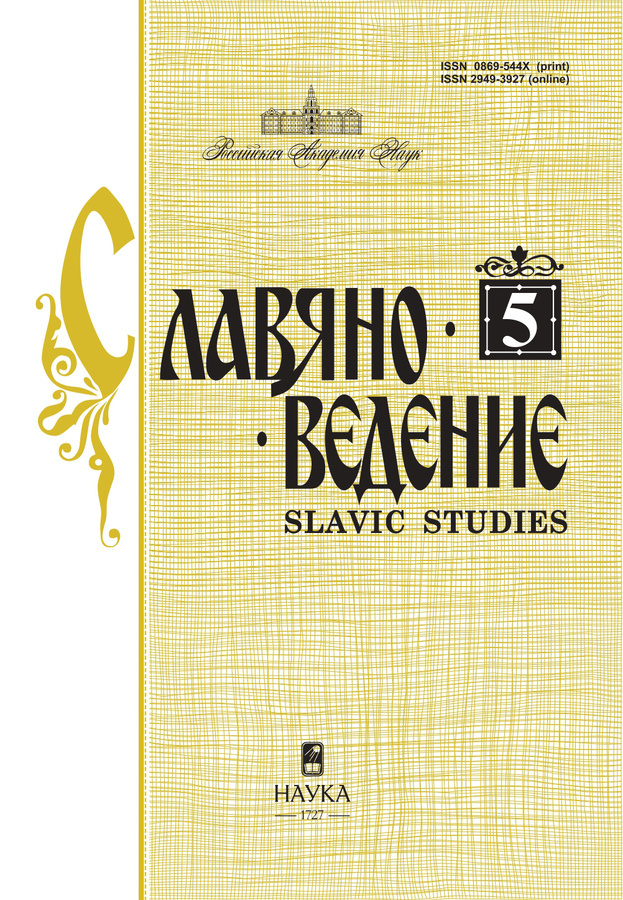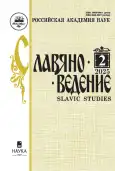Axiological Aspect of Slavic Lower Mythology
- Authors: Valentsova M.M.1
-
Affiliations:
- Institute of Slavic Studies of Russian Academy of Sciences
- Issue: No 2 (2025)
- Pages: 111-118
- Section: К юбилею Ирины Александровны Седаковой
- URL: https://gynecology.orscience.ru/0869-544X/article/view/680827
- DOI: https://doi.org/10.31857/S0869544X25020108
- EDN: https://elibrary.ru/IYHXZZ
- ID: 680827
Cite item
Abstract
This article was written for the jubilee of Irina Aleksandrovna Sedakova, DrSc of Philology. It touches upon one of the jubilee's favourite topics – axiology, i.e. the science of evaluations and values. The material for the study is the lower mythology of the Slavs. The study briefly outlines those areas in folk demonology, with which one can judge about the values and principles of evaluation of the surrounding world and people (through the prism of mythological characters and motifs of mythological prose) in the Slavs. The question of axiological differences between paganism and Christianity is inevitably touched upon. While the latter is characterised by binary oppositions of good and evil, folk mythology is characterised by ambivalence and even multivalence. The values in both worldview systems are also different. For folk demonology these are mainly personal and social values: survival, harvest, wealth, power, strength, skills, nature, etc. The examples of mythological stories given in the article demonstrate, on the one hand, the ambivalence of evaluations, and on the other hand, the presence of different from modern ones evaluations (e.g. the danger of alien ethnicity), or outdated values (e.g. survivability).
Full Text
About the authors
Marina M. Valentsova
Institute of Slavic Studies of Russian Academy of Sciences
Author for correspondence.
Email: mvalent@mail.ru
ORCID iD: 0000-0002-6541-4269
PhD (Philology), Senior Research Fellow
Russian Federation, MoscowReferences
- Antropotsentrizm v iazyke i kul’ture. Moscow, Indrik Publ., 2017, 264 p. (In Russ.)
- Košťál J. Vodník v podání lidu českého. Český lid 1, 1892, pp. 52–58. (In Czech)
- Rak М. Materiały do etnografii Podhala. Кraków, Uniwersytet Jagiellonski, 2016, 443 p.
- Shchepanskaia T.B. Vlast’ prishel’tsa: atributy strannika v muzhskoi magii russkikh. Simvoly i atributy vlasti. Genezis. Semantika. Funktsii. St. Petersburg, MAE Publ., 1996, pp. 72–101. (In Russ.)
- Tolstoi N.I. Iazyk i narodnaia kul’tura. Ocherki po slavianskoi mifologii i etnolingvistikke. Moscow, Indrik Publ., 1995, 512 p. (In Russ.)
- Valentsova M.M. Mifologicheskije personazhi – «pomoshchniki» i «dariteli». Tezisy dokladov Tret’jei nauchnoi konferentsii «Demonologiia kak semioticheskaia sistema». Moskva, RGGU, 15–17 maia 2014. Moscow, RGGU Publ., 2014, pp. 26–29. (In Russ.)
- Valentsova M.M. Khristianskije elementy v narodnoi demonologii slavian. Slavica Slovaca, 59, 2024, no. 2, pp. 361–370. (In Russ.)
- Vinogradova L.N. Perspektiven li otsenochnyi priznak dobryi / zloi dlia klassifikatsiii demonologicheskikh personazhei? In Umbra. Demonologiia kak semioticheskaia sistema. Al’manakh, vyp. 5, otv. red. i sost. D.I. Antonov, O.B. Khristoforova. Moscow, Indrik Publ., 2016, pp. 309–332. (In Russ.)
- Znatki, veduny i chernoknizhniki. Koldovstvo i bytovaia magiia na Russkom Severe, pod red. A.B. Moroza. Moscow, Forum; Neolit Publ., 2012, 592 p. (In Russ.)
Supplementary files








